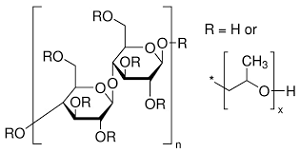HI! I’M ELEMENT AI.
Hydroxypropyl Cellulose

Product Description
Hydroxypropyl cellulose (HPC), a water-soluble cellulose ether, finds various industrial applications owing to its unique properties.
Product:
Hydroxypropyl Cellulose
CAS:
9004-64-2
Synonym:
Cellulose, 2-hydroxypropyl ether; Oxypropylated cellulose
Structure:

Typical Characteristics
Appearance
White to slightly yellowish powder
Density
0.5 g/cm3
Melting point
Decomposes
Molecular Weight
15000-300000
Odor
Odorless
Purity
99%
Refractive index
1.5600
Uses, Applications & Markets
Key applications
get a quote
We Offer Hydroxypropyl Cellulose
in various grades
A few of the grades available are listed below:



Hydroxypropyl Cellulose used in many
industry applications
Hydroxypropyl cellulose (HPC), a water-soluble cellulose ether, finds various industrial applications owing to its unique properties. Here's a list of some of its industrial uses:
- Pharmaceutical Industry: HPC is widely used as a binder, film-former, and controlled-release agent in tablet formulations. It helps in enhancing tablet strength, improving coating quality, and controlling drug release rates.
- Food Industry: In the food industry, HPC serves as a thickener, stabilizer, and emulsifier in products like sauces, dressings, and desserts. It improves texture, consistency, and stability of food products.
- Cosmetics and Personal Care: HPC is used in personal care products such as lotions, creams, and hair gels as a thickening and film-forming agent. It enhances product texture, spreadability, and provides a smooth feel.
- Coatings: In the coatings industry, HPC acts as a thickener and film-former in paints, varnishes, and protective coatings. It improves the application properties, adhesion, and durability of coatings.
- Adhesives: HPC is utilized in adhesive formulations for its thickening and film-forming properties. It is used in various adhesive applications, including paper, packaging, and construction adhesives.
- Construction Industry: In construction, HPC is added to cement and mortar formulations to improve workability, water retention, and adhesion. It helps in reducing shrinkage and enhancing the strength of construction materials.
- Textile Industry: HPC is used in textile printing and finishing processes as a thickening and film-forming agent. It improves print definition, color yield, and provides a soft feel to fabrics.
- Paper Industry: In the paper industry, HPC acts as a surface sizing agent and coating binder. It enhances paper strength, smoothness, and printability, improving the quality of paper products.
- Detergents: HPC is employed in detergent formulations as a thickener and stabilizer. It improves the viscosity and stability of liquid detergents, enhancing their cleaning efficiency.
- Ceramics: HPC is used in ceramics processing as a binder and plasticizer, enhancing the workability and mechanical properties of ceramic bodies and glazes. It aids in shaping, drying, and improving the quality of ceramic products.